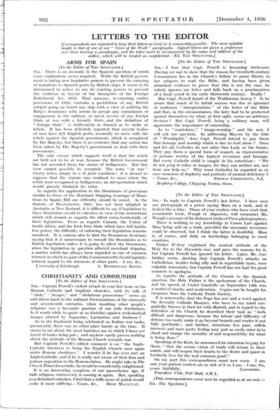ARMS FOR SPAIN
LETTERS TO THE EDITOR
[Correspondents are requested to keep their letters as brief as is reasonably possible. The most suitable length is that of one of our News of the Week" paragraphs. Signed letters are given a preference over those bearing a pseudonym, and the latter must be accompanied by the name and address of the author, which will be treated as confidential.—Ed. THE SPECTATOR.] [To the Editor of THE SPECTATOR.]
Sin,—There is an anomaly in the Spanish question of which some explanation seems required. While the British govern- ment is taking new legislative powers to prevent the carrying of munitions to Spanish ports by British ships, it seems to be determined to refuse to use its existing powers to prevent the violation in favour of the insurgents of the Foreign Enlistment Act, 1870. That measure, re-enacting earlier provisions of 1819, contains a prohibition of any British subject going on board any ship with a view of quitting the King's dominions with intent to accept any commission or engagement in the military or naval service of any foreign State at war with a friendly State, and the definition of " foreign' State " is deliberately so framed as to strike at rebels. It has been definitely reported that several bodies of men have left English ports, avowedly to serve with the rebels against the Spanish government, which is recognised by His Majesty, but there is no evidence that any action has been taken by His Majesty's government to deal with their movements.
The only excuse which suggests itself is that the rebels are held not to be at war, because the British Government has not accorded them the status of belligerents. But this view cannot possibly be accepted. The term at war " clearly refers simply to a de facto condition ; it is absurd to suppose that the statute was confined to cases where the rebels were recognised as belligerents, an interpretation which would gravely diminish its value.
As regards the application to the Dominions of provisions similar to those of the Merchant Shipping (Carriage of Muni- tions to Spain) Bill one difficulty should be noted. As the Statute of Westminster, 1931, has not been adopted in Australia or New Zealand, it is difficult to say if legislation by these Dominions would be effective in view of the restrictions which still remain as regards the effect extra-territorially of their legislation. Even as regards Canada, the Union of South Africa, and the Irish Free State which have full legisla- tive power, the difficulty of enforcing their legislation remains unsolved. It is curious also to find the Dominions Secretary saying that it is unnecessary to consult the Dominions as to British legislation unless it is going to affect the Dominions, when the legislation in question affected merchant shipping, a matter which has always been regarded as one of common interest on which no part of the Commonwealth should legislate without regard to the interests of other parts.—I am, &c.,




















































 Previous page
Previous page